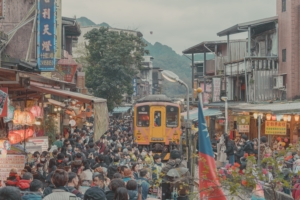Fragility and Rule of Law in Taiwan
 The United Nations (U.N.) defines the rule of law as a system that holds both the State and common citizens accountable to equally enforced laws that adhere to international human rights standards. Currently, the Rule of Law is experiencing significant strain due to escalating tensions between the People’s Republic of China and Taiwan.
The United Nations (U.N.) defines the rule of law as a system that holds both the State and common citizens accountable to equally enforced laws that adhere to international human rights standards. Currently, the Rule of Law is experiencing significant strain due to escalating tensions between the People’s Republic of China and Taiwan.
History of the Rule of Law in Taiwan
In 1945, at the end of the Second World War, Taiwan became part of the Republic of China. However, in 1949, a civil war broke out in mainland China, prompting nationalist forces under Chiang Kai-shek of the Kuomintang (KMT) party to flee to Taiwan. Both sides asserted their claim to represent all of China.
Chiang Kai-shek assumed the presidency and enforced strict martial law, leading an authoritarian government that seldom addressed poverty or the plight of Taiwanese citizens. Corruption thrived, and poverty was widespread as the country suffered from mismanagement under his rule. Rebellions were violently suppressed. Despite this, the Taiwanese people held onto their spirit and hope, envisioning a future marked by freedom and equality.
The KMT ruled for up to five decades until the Democratic Progressive Party (DPP) won the 2000 and 2004 elections. However, it returned to power in 2008 and 2012. But after the third democratization of Taiwan, in 2016, the first female president of Taiwan Tsai Ing-wen of the DPP was elected to power.
Tensions With China
Since 1949, Taiwan has been officially called the Republic of China. Only 13 countries in the world recognize Taiwan as a separate country. China has openly stated that it does not believe in Taiwan’s independence and does not recognize Taiwan’s democratic rights as a separate sovereign state.
Chinese President Xi Jinping claimed in October 2019 that “reunification” with Taiwan “must be fulfilled,” considering it a breakaway province. The Chinese Communist Party has even threatened the use of force if Taiwan declares itself an independent country.
The One-China Policy
The One-China Policy recognizes the authority of the Chinese government as the sole representative of China. In its relations with China, the United States (U.S.) acknowledges this policy and has formal ties with China instead of Taiwan.
Under President Jimmy Carter, the U.S. established diplomatic ties with China in 1979. This resulted in an end to its connections with Taiwan and the U.S. closed its Taipei embassy.
However, the U.S. passed the Taiwan Relations Act in 1979, which aims to protect the human rights of Taiwanese citizens and advocates for a peaceful resolution to determine Taiwan’s future. The U.S. claims that it upholds an “unofficial robust” relationship with Taiwan and that it is an important economic and foreign ally.
On the other hand, Beijing believes that there is only “One China” and maintains a “One-China Principle”. China claims that Taiwan is an unalienable part of mainland China. The Chinese- Taiwanese relations continue to be tense to date.
The Rule of Law and Poverty
Constant political tensions and COVID-19 have aggravated the uneven income distribution in Taiwan over the past three years. More than 68% of workers earn below-average salaries. This is evident in the high cost of living in Taipei. An estimated 50% of employees receive a monthly salary lower than NT$42,000, and this can easily qualify as living in poverty.
In addition, critics often raise concerns about the government’s calculation of the poverty index in Taiwan. Currently, the poverty rate relies on the relative poverty line, which is “60% of median disposable income per capita,” with varying thresholds for each city or province. The baseline is set at TWD 10,244. Low-income families below the threshold receive benefits and services. However, if a family’s income surpasses the monthly threshold for a specific area, they have limited access to aid, which may increase the risk of poverty.
Current Rule of Law Under Tsai Ing-wen
President Tsai Ing-wen is known to fight for her country’s democratic rights and provide opposition to the One-China policy. Most recently, in April 2023, the Taiwan President and U.S. House Speaker Kevin McCarthy met in California to further friendly and peaceful relations. Her administration has received praise for effectively managing the COVID-19 pandemic through vaccination campaigns, contact tracing and quarantines for travelers.
In terms of quality of life, according to InterNations, 75% of expatriates are content with a high quality of life, affordable health care, green goods and beautiful infrastructures.
Ongoing Defense Efforts
On June 10, Ing-wen stated that she will use new technology to improve and strengthen Taiwan’s defenses. The president is also working toward safeguarding border security in response to Chinese showcases of military superiority. Ing-wen has vowed to make Taiwan a prominent contributor to the global economy with new biotechnology and green energy initiatives.
The Taiwanese people continue to have a strong sense of community, strength and support for each other through non-profit NGO charities such as Tzu Chi and Garden of Hope.
In Romanized Taiwanese, Tzu Chi stands for “relieving suffering with compassion”. In 1966, Dharma Master Cheng Ten founded the organization in Hualien, an impoverished rural area of Taiwan. Tzu Chi strongly believes in healing spiritual poverty by spreading the message of love, compassion and humanitarianism regardless of gender, ethnicity and race.
Tzu Chi also fights poverty by fundraising and creating grassroots volunteers around the globe. They provide holistic support and humanistic education. It now has around 77,621 core volunteers and thousands of members worldwide.
Looking Ahead
With continuous and unwavering support from other developed countries, Taiwan can potentially strengthen its democratic rule of law and create more growth and stability for its local citizens.
–Sharvi Rana
Photo: Unsplash
